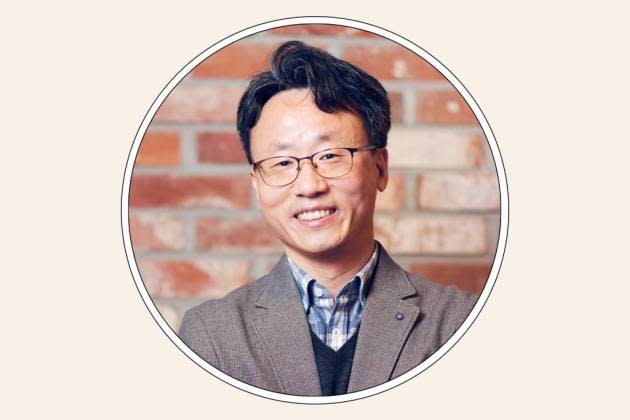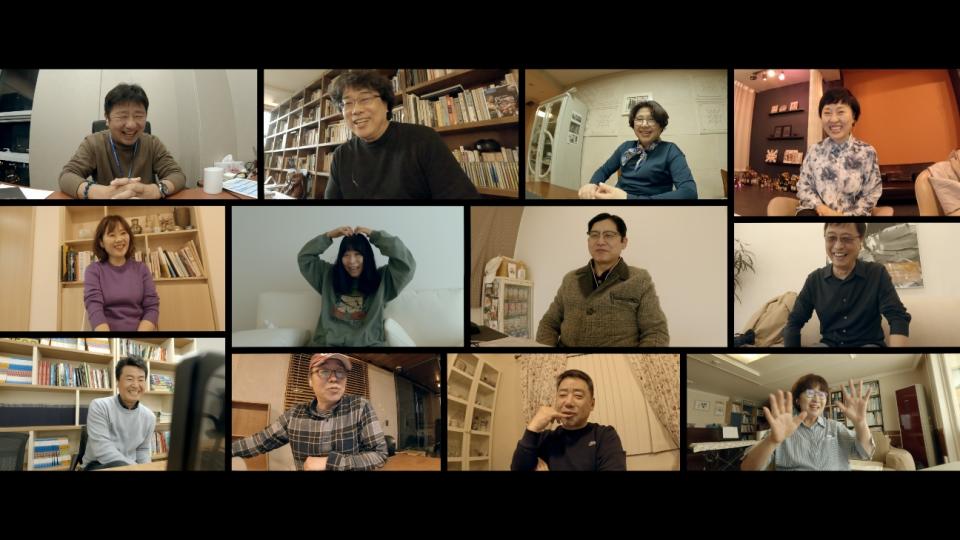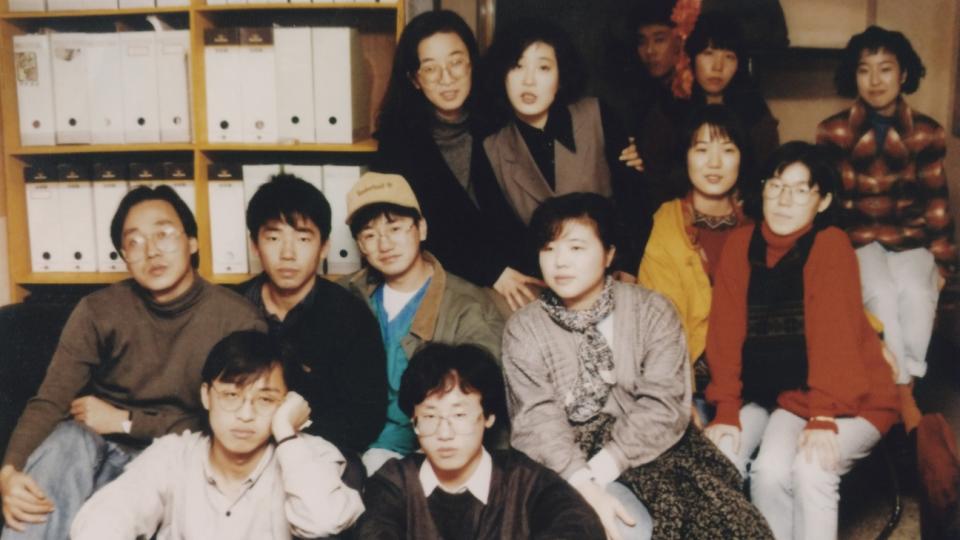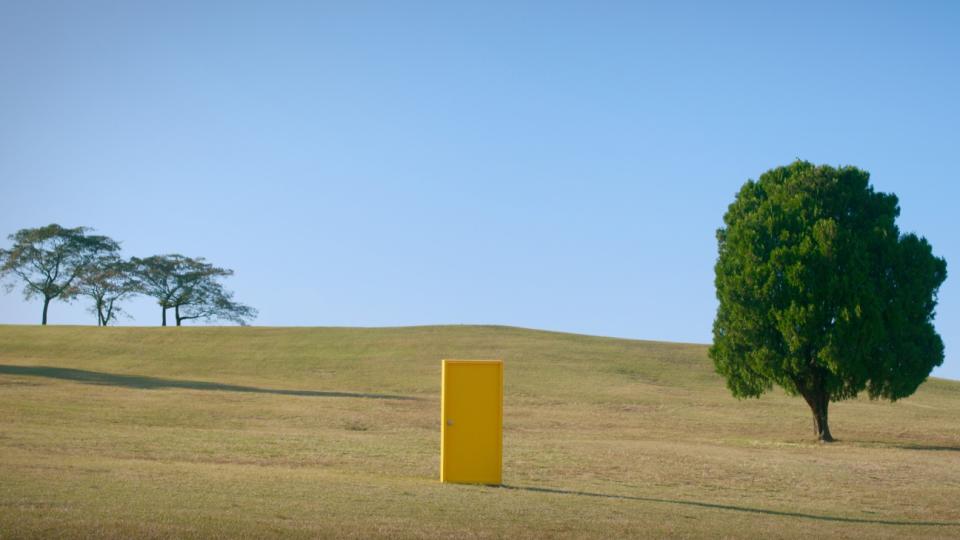Director of Netflix’s ‘Yellow Door’ Doc Talks Bong Joon-ho’s Early Days, Evolution of Korean Film

For Korean cinema completists, Netflix’s forthcoming documentary Yellow Door: ’90s Lo-fi Film Club will arrive like manna from heaven when it launches worldwide on Oct. 27. Among the film’s many pleasures is the depiction of Oscar-winning director Bong Joon-ho’s previously unknown first film, a stop-motion animated short titled Looking for Paradise that he made in his home basement in 1992. But the documentary is ultimately about much more than that — it’s a love letter to movie connoisseurship itself.
Directed by noted documentarian and editor Lee Hyuk-rae (Sewing Sisters, 2020), Yellow Door takes viewers back to Seoul, South Korea in the early 1990s, when film clubs were popping up on local college campuses for the first time, providing young students with new cultural encounters and a platform to study the art of cinema. Much of today’s global boom in Korean film and television can be traced back to this formative, freewheeling period. The country had just emerged from the trauma of the student pro-democracy protests of the 1980s — and their often brutal suppression by the former authoritarian government — but the 1990s became a more carefree period of expanding creative freedom and cultural exploration among the young.
More from The Hollywood Reporter
Yellow Door: ’90s Lo-fi Film Club retraces the memories of one of the era’s many such movie collectives, the Yellow Door Film Club, which happened to include the now globally acclaimed director Bong Joon-ho among its key members (as well as the documentary’s director, Lee). A fresh-faced Bong was an integral part of the group, responsible for cataloging and managing the club’s library of bootleg VHS copies of cinematic masterpieces from around the world. And the Yellow Door cohort served as the very first audience for a Bong-directed film — he nervously presented his first short, Looking for Paradise, to the group in 1992 — which is described and dissected in amusing fashion throughout the documentary. But a big part of the new film’s charm comes from the fact that its primary interest isn’t in exploring the generative role such clubs played in the careers of the members who later became acclaimed directors (although there is some of that). Instead, the film gives equal voice to the now middle-aged film geeks whose lives went in much more ordinary directions — marriage, kids, office jobs, etc. — presenting the Yellow Door era as a treasured, shared memory of naive and hopeful aesthetic exploration, regardless of whether they happened to go on to win Oscars.
Yellow Door: ’90s Lo-fi Film Club premiered at the Busan International Film Festival last week, winning the event’s “Busan Cinephile Award” — which, appropriately, is the festival’s one honor that is selected by a jury consisting of undergraduate and graduate students from local film schools.
The Hollywood Reporter connected with Lee to discuss the creation of the documentary and how the love of cinema has evolved in Korea.
What was the initial inspiration for telling this story as a documentary and how did the project get going?
It actually began by thinking about how I should just try to get everybody together for a reunion because it was going to be the 30-year anniversary of The Yellow Door [collective]. And while we were just chatting among ourselves, we talked about how studying film 30 years ago — the act itself — was so vastly different from today. And we were reminded of a lot of funny stories that took place back then. So that naturally led us to think that it would be really great if we could create a documentary.
When we actually proposed this idea to director Bong, the first thing he said was that he had only one condition. He wanted to be sure that he would not be the center of attention or main character, but just one of the members of the Yellow Door club. He said as long as that condition was met, he would be happy to participate. The reason he gave us that condition is because, with his growing fame, there have been many books and documentaries made about him in Korea that never got his approval. These documentaries and biographies tend to tell his story as a cliche success story — and if you’ve watched Bong Joon-ho’s films, I’m sure you can guess that this is something he really detests. So he almost had like a sense of PTSD about being the center of another documentary.

How did that condition shape how you got started on the project?
Well, when we first put together a synopsis and pitched it to Netflix, Hanna Moon, the content manager who was in charge of this project, took a look at our script and was surprised to find that it wasn’t about director Bong but about the Yellow Door club itself — and she said this actually intrigued her more. We were quite surprised by that, but then it turned out that Hanna had herself been a member of a student film study group — one that was actually created by director Hwang [Dong-hyuk], creator of Squid Game. So she had that personal nostalgia attached to the concept of student film study groups and we had touched that within her. A very large majority of the industry insiders in Korea —people now working in film, media, or TV — actually share this common memory of having been a part of these student film study groups. So we thought this document could become something bigger — something that was not just of interest to the actual members of the Yellow Door group, but more universal.
I’m curious to hear more about that last part… What kind of thematic value did you think this story would hold for a general audience — both in Korea and around the world?
From the initial stages of the planning process, one theme that we all agreed very strongly on was the universal experience of falling in love with films, books, music, or any kind of art. How, when you’re young, you can think that you’re the only person who is so crazy about these things — until you find other people who share that same passion, which brings you even more joy, entering this community. Some people take this passion and make it the foundation of a career — and some, like director Bong, even go on to achieve global success with it. However, there are a lot of people who just carry their youthful love of art as a very precious memory — a time that was very nostalgic and romantic in their past. And that doesn’t mean that becoming Bong Joon-ho is the right answer. This isn’t to say that you’ve betrayed your youthful passion for film if you didn’t become a director. It’s just the opposite. I think this film will resonate most with people who didn’t follow their passion into a career. It’s more for people who are living lives that are a little bit different from the path they originally dreamt of. I hope the film serves as an opportunity for them to be reminded of how much love they harbored for whatever it was in their past — and how precious that experience was. So, in terms of thematic value, I felt like it could be a very universal story that’s not restricted to the field of film.
I did find myself curious about how many of the original Yellow Door members went into the film industry in some capacity. There are clear examples of both in the documentary.
It’s tough to give an exact percentage, because there are 12 former members who appear in the film, but there were so many others who came and went as temporary members. So it’s tough to count all of them. Among the 12 people who appear in the film, four of them — including director Bong — are in the film business and one other is teaching film. So, even among this group, more than 50 percent are leading lives that have nothing to do with the movies.

Aside from his request not to be the main character of the story, did director Bong offer you any other creative input throughout the process of making the film?
Before the final edit came out, we showed a version to director Bong and he had some concerns that maybe the movie would be something that only former Yellow Door members could enjoy. But when we showed him a version that was close to the final edit, he told me he felt it would really resonate with a lot of people who have nothing to do with filmmaking, and he congratulated me.
Overall, director Bong deliberately didn’t want to give any kind of directorial advice. I think if it had been a project that had nothing to do with him, he probably would have been very helpful and given me a lot of advice. But since he was one of the subjects of the documentary, I believe he felt like it would have been an invasion of my role as director to offer me too many of his own thoughts. But I actually really wished he would have given me more advice! (Laughs) But his interviews were actually the very first that we did, because he was scheduled to leave for London to shoot Mickey 17. So we interviewed him without any preparation whatsoever. But later, looking back on the footage of his interviews, it what was really interesting to see how much he gave us as source material for the overall structure of the documentary. He remembered a lot of funny stories, and he mentioned various people in a deliberate way, which gave us ideas of who to include. So, looking back on it, he actually did give us a lot of help.
The film also has historical value for lovers of Asian cinema, in the way that it explains some of the generative background to the Korean film industry’s explosion of creativity in the late 1990s and early 2000s. How has the culture of film appreciation in Korea changed since then and what do you think it might say about the future creativity of your industry?
Okay, I first want to give you a disclaimer that I might digress or get a little bit lost in my attempt at an answer (Laughs).
Totally understand. It’s a ridiculously broad question.
If you take a look at the overall process of how this film came about, how it was made, how it premiered, and how it will be released to the public, there is something very peculiar about the whole process. First of all, it is a story of people who believed that only films shown on the big screen are real cinema, but it shows these people living in a time when the only way they could get access to precious cinema was via low-quality, illegally copied VHS tapes. And then this documentary itself was created through a platform called Netflix, which creates a lot of high-quality content that is openly and legally distributed worldwide. But the film had its world premiere on a big screen in a cinema at the Busan International Film Festival. So, it’s a very strange and complex process, tracing the currents of film culture through these realities. I think that strangeness symbolizes the current changes we are experiencing in film culture, both globally and in Korea.
To try to answer your question from the business side of things, during the process of creating this film, as a partner director with Netflix, I have to say that I was able to enjoy a lot of creative freedom. If I had done this project with a smaller company, the stakes would have been much higher for them, and they probably would have asked us to focus more on director Bong. But at Netflix, because this was just one film among their many projects, they gave us the room to really discover the true charm and gentle appeal of this story.
However, the level of creative freedom that I was able to enjoy during this process, and the fact that it comes from the scale of a company like Netflix, does give me some mixed feelings — because you never know if this is going to lead to gains or losses for Korean cinema overall. We just can’t tell. So, I do have some concerns about whether it is okay for me to talk freely and nonchalantly about having that creative freedom thanks to Netflix.
Speaking from a director’s perspective, the biggest concern I have these days is that the viewers [of these streaming platforms] have complete control to stop, fast forward or watch your film at 2x times speed — or just completely leave the film.
A while back, I watched 2001: A Space Odyssey on the big screen at the Korean Film Archive. On the big screen, no matter how bored you get, you can’t run away, or look at your phone. I had to sit there and succumb to the pace and rhythm that was decided by Stanley Kubrick. There are indeed scenes in that film that are very boring, but they are essential to what makes the film so intriguing and emotionally moving. You know, the power of Kubrick, the power of the great masters, is the power that all filmmakers aspire to — but I question whether directors with that potential will even be able to effectively deliver it to an audience today with these new viewing conditions.
However, I recognize that there is a huge irony here. My documentary is all about the first generation of Korean film lovers who studied film on VHS thanks to the rewind function — and 30 years later, those of us who have become directors are living in fear of the fact that our audience has the power to control the pace of the films we create.

Best of The Hollywood Reporter
13 Times Hollywood Predicted the Scary (or Not So Scary) Future of AI
Kim Cattrall and Five Actors Who Made Surprising Returns to a Role
21 Actors Who Committed to Method Acting at Some Point in Their Career

